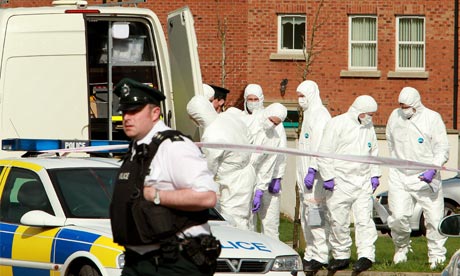Omagh murder fuels fears that terror groups have new weapons
Anti-ceasefire republicans better-organised, say security forces as booby-trapped car kills 25-year-old Ronan Kerr

Republican dissidents have perfected a new generation of weapons with which to launch a fresh terrorist offensive, senior security sources have told the Guardian.
The security sources in the Irish Republic, already concerned about a renewed undercar booby-trap bomb threat, say anti-ceasefire republicans have been working on a mortar bomb device, one of which was seized recently near Dublin.
In a further worrying development Irish security sources told the Guardian that a new form of TNT explosive had been discovered during a Garda raid on a republican dissident arms dump in Dunleer, Co Louth last year.
Security sources in Britain have also indicated that the threat from the dissident republican terror groups has become more pronounced in recent weeks. MI5, which has overall responsibility for security in Northern Ireland, states on its website: "There have been increasing signs of co-ordination and co-operation between republican terrorist groups."
The revelations come as the investigation continues into the murder of newly qualified Catholic police officer Ronan Kerr. The 25-year-old died after a booby-trap bomb placed underneath his car parked outside his home in Omagh exploded shortly before 4pm on Saturday.
Kerr had only graduated from the police training college in December and was one of a new generation of Catholic officers.
At a press conference in Belfast on Sunday Chief Constable Matt Baggott said those behind the Omagh murder had "killed a peacemaker". He branded Kerr's killers as a "potent and dangerous minority" and added: "A mother has lost her brave son, made all the more horrific that it is Mother's Day today."
On Sunday night Kerr's mother, Nuala, said the aim of a neutral police service should be upheld: "This is at a time when we are striving for a neutral police force for the good of our country and I urge all Catholic members not to be deterred by this. We all need to stand up and be counted and to strive for equality.
His death provoked anger across Ireland and the world with the US secretary of state, Hillary Clinton, condemning those responsible.
On a visit to the murdered constable's family in Beragh, just outside Omagh, Northern Ireland's first minister, Peter Robinson, said the attack was "despicable and evil". The Democratic Unionist leader said he was confident that despite the targeting of the Catholic policeman more young Catholics would join the PSNI.
"I know my fellow citizens and they will not be deterred from joining the police by those behind this terrible terrorist murder," he said.
Gerry Adams, the Sinn Féin president, described the killing as "futile", while unionists said it was time to clamp down on the republican dissidents.
The ongoing dissident threat has made it one of the busiest years so far for bomb disposal experts, with security forces on both sides of the Irish border bracing themselves for a fresh terrorist offensive.
A senior security source said the Republic's security forces had found a sophisticated technical element to a new mortar bomb launcher which Irish police recovered during an operation on the M1 motorway linking Dublin to Belfast late last year.
The device was potentially more deadly and accurate than the mortar bomb launchers used in Northern Ireland in recent times, the security source stressed. The mortar find and the explosives indicate that republican terror groups opposed to the peace process have improved their engineering techniques and secured new war material from easternEurope.
The lethal bomb blast brought back memories of the Omagh atrocity in August 1998 when 29 people, including a woman pregnant with twins, were killed in a Real IRA car bombing. It was the single biggest atrocity of the Ulster Troubles.
Before Saturday's murder the Real IRA and Óghlaigh na hÉireann (ONH) had resumed their bomb and hoax bomb attacks across Northern Ireland. A car bomb was left by the Real IRA outside Derry city's courthouse last Sunday evening and put the lives of the public, including choirboys practising in the nearby Church of Ireland cathedral, at risk. Meanwhile an ONH hoax bomb caused widespread disruption in north Belfast last week.
The recent upsurge in dissident republican violence followed a lull over the last few months. This was partly due to a series of intelligence successes against the anti-ceasefire republican groups, mainly by the Garda Síochána in the Republic.
According to security sources there has been a slow but significant movement of former Provisional IRA individuals to the dissident groups which are now estimated to total between 700 and 800 active members.
They said recruitment to the dissident groups had been encouraged by the economic climate and increasing unemployment in Ireland, and youngsters who have joined the groups have no memory of the security measures imposed during the Troubles, the sources said.
In addition, the IRA and Sinn Féin no longer have the power or influence to stop attacks.
No comments:
Post a Comment